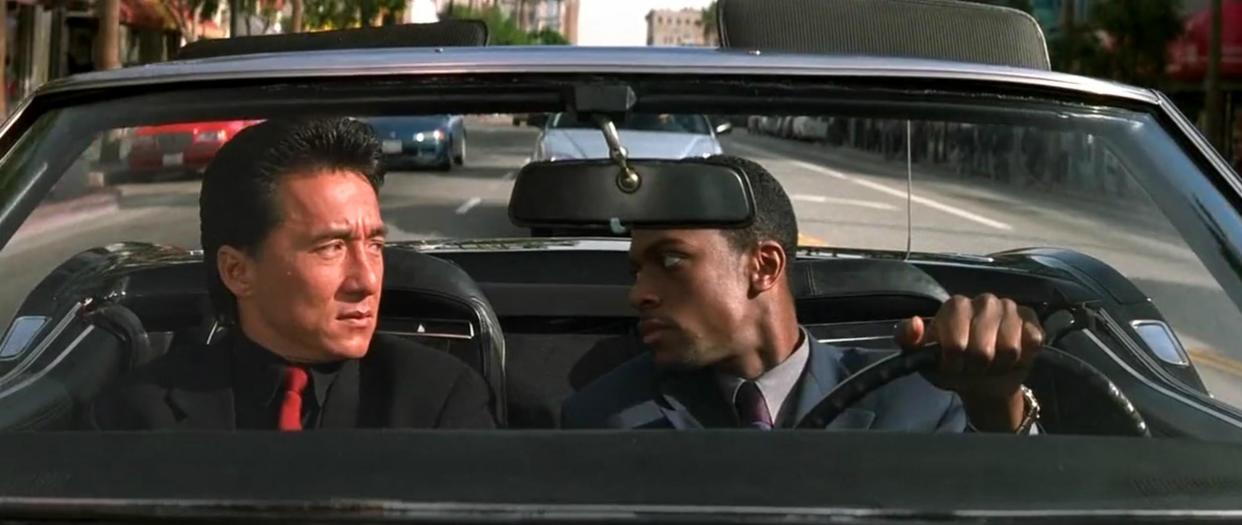Rush Hour is still an undeniably charismatic buddy comedy about American complacency

It was 20 years ago today that Hong Kong Police Force Detective Inspector Lee stepped onto the tarmac at LAX, ready to deliver roundhouse kicks to the faces of oversized henchmen in oversized suits.
Absurdly enjoyable, if a little offensive by today’s standards, Rush Hour can in retrospect be accused of many things, but anachronism is not one of them. So many action movies have revolved around unlikely plots by antiquated villains – usually Russians with severe Cold War grudges – but Rush Hour‘s premise was perfectly contemporary.
Set in 1997 during the last day of the British rule of Hong Kong and released a year later, it sees this peaceful handover interrupted by the kidnap of the Chinese consul’s daughter on US soil. She's snatched from a car by masked men while she is singing along to Mariah Carey’s “Fantasy”; the only reason we have an idea who's behind the abduction is because there’s an English cast member. Tom Wilkinson is the evil Brit on this occasion, a commander who, it transpires, is secretly the mysterious crime lord known as Juntao. Yet he's motivated not by the usual megalomania or archaic national rivalry, but the loss of his collection of priceless Chinese artefacts thanks to the Hong Kong handover. We already have a little girl strapped with a bomb vest and a maniacal art dealer in play, then, and that’s even before our protagonists arrive.

Jackie Chan plays the efficient Hong Kongese detective that the consul demands be put on the hostage case, much to the annoyance of the FBI who want to keep the case American goddamnit. Their solution? Stick it to the LAPD (who the FBI hate for some undisclosed reason) by having one of its officers essentially babysit him. Enter Chris Tucker as Carter, the maverick cop prone to theatricality whom the LAPD chief gives the job as a prank. This premise all bears recapping because it is a) brilliant b) ridiculous and c) really quite original.
Rewatch Rush Hour and it’s impossible not to be charmed by Chan and Tucker’s chemistry, just as the majority of critics were in 1998. “Rush Hour is lightweight and made out of familiar elements, but they’re handled with humour and invention,” Roger Ebert wrote in his original review – a three-starrer but one with a lot of compliments for both Tucker and Chan.
It’s clear long before the film’s obligatory in-credits blooper reel that the pair are having a lot of fun on set. Typically ending scenes with non-sequitur Michael Jackson dance moves, Carter is a fountain of one-liners and sass – all delivered in Tucker’s signature semi-falsetto. Lee, meanwhile, is the perfect foil to his unlikely partner: more straight-laced and humble, but sharing Carter’s childish enthusiasm for life. This is best illustrated when Carter teaches Lee the correct lyrics to Edwin Starr’s “War”, a carefree and jubilant scene that has more personality than any you’ll find in this year’s biggest and most critically-acclaimed action movie, Mission: Impossible – Fallout.
Rush Hour‘s stunts might not be able to match the grandiosity of those being staged today in films like Fallout, but there is something just as satisfying about their cinematic simplicity. Choreographed by Chan and his team in the tradition of Hong Kong martial arts movies, the fight scenes eschew the fast cuts and dizzying number of camera angles usually found in Hollywood action films, instead inviting you to just marvel at Chan’s kung-fu prowess. They play out balletically and yet still have plenty of comedy. Lee pots balls while fighting around a pool table, weaponises a man’s belt, and tries to stop Ming vases from toppling as he breezily dispatches henchmen at an auction. Chan uses a key prop or piece of furniture in every way possible; give the man an ironing board and he’ll find 17 different ways to stylishly “whoop somebody’s ass” (to paraphrase Carter) with it.
Ken Leung also gives a great, understated performance as Juntao’s laconic arch-henchman Sang in Rush Hour. Following it, Leung would go on to move outside of the action genre and appear in dramas like Vanilla Sky and The Squid and the Whale. It’s Tucker and Chan who are the beating heart of Rush Hour, though, their star power propelling it through two subsequent sequels, with a fourth now lined up for 2019.

Yes, there are some stupid racial slurs from Carter along the way, but, to my relief during the rewatch, the film doesn’t once invite you to laugh at them. Instead, Carter’s stereotyping presents Lee with an opportunity to give him the slip. Lee takes advantage of Carter’s ignorance, letting him believe he doesn’t speak English and then ultimately escaping his watch when Carter embarrasses his country by taking the Hong Kong detective to Chinatown. The joke is always on America. On its complacency or its undignified manners or its inability to think about any country other than itself.
What is particularly striking and evokes a warmer, fuzzier feeling than ever when watching Rush Hour back is how Lee is able to overlook Carter’s ignorant worldview and see the good in him. Early on in the movie, even before the two men have established a friendship, Lee has the opportunity to bust Carter and have him sent back to the precinct. But he doesn’t. It’s an under-explained scene and the most subtle and poignant one so many years later. Lee, in that moment, chooses not to punish his new colleague but give him a chance to prove he can be a better man.

 Yahoo Movies
Yahoo Movies 
